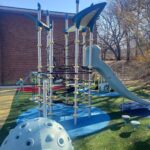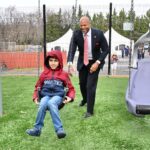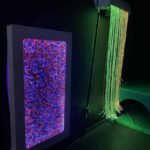
by thechildrensguild | Sep 5, 2024 | Mental Health, News, Parenting, Special Education
Potential risks for your kids are everywhere today, with social media, virtual worlds, gaming, internet sites, inappropriate online content, and security. We know you are concerned, and that every day you are working hard to balance their screen time and your safety concerns.
And if your child has special needs, technology can be an essential tool in their communication and learning – so limiting access is not always an option. Children with ADHD, mood disorders, and other conditions that manifest with impulsivity, may have an even harder time making good choices and following the family rules online.
How can parents navigate this, especially with school starting, new friends entering the picture, and their kid’s online worlds constantly expanding? There are plenty of safety and awareness measures you can take to help mitigate the risk, even if you can’t remove it completely from their lives.
The Children’s Guild (TCG) has always been concerned about the proliferation of cell phone use and the potential impact of the Internet on children. Several years ago, TCG started reminding parents and other concerned adults to educate, discuss, and monitor phone use to help young people sort out their relationship with their devices.1
So much has changed, but even five years ago when this article was first published—an eternity in the world of technological progress—there were significant concerns about kids and the internet. With the rapid advancements in technology, we know your concerns have only grown, as the digital landscape continues to grow at an incredible pace.
Today we recognize that there’s no one-size-fits-all solution to keeping kids as safe as possible online. Over the years, we have constantly monitored the evolving digital world and adjusted our recommendations to address new habits and trends.
The U.S. Surgeon General has even issued a “youth mental health crisis” stemming from social media. Another recent article delves into the topic of phone usage and the mental health issues that are attributed to social media, and cites that “parents should be doing more to engage their child in ways that don’t involve technology so when they get home from school, they’re less incentivized to get right back on their phones.”
As technology continues to advance rapidly, here are some key considerations for monitoring your child’s behavior online:
1. START A CONVERSATION – AND KEEP IT GOING
If you haven’t already, it’s time to start the conversation about social networking, privacy, phones and tablets, computer security, and dealing with cyberbullying. Kids may push back against your reminders, cautions, and questions. But it’s still critical that you talk about it all. Discuss inappropriate conduct online. Have a conversation about people online who may have bad intentions, like bullies, predators, hackers, and scammers. And let them know how you feel about content, like pornography, violence, or hate speech.
Children with ADHD or special needs may have difficulty understanding social cues or recognizing unsafe situations online. It’s crucial to tailor conversations to their comprehension level. Break down topics into smaller, manageable discussions and use clear, concrete examples. Role-playing different online scenarios can help them better grasp the concepts and practice safe behavior.
2. BE SMART WITH SMART PHONES
There are no set rules for when kids can have cell phones. Consider their age, personality, maturity, and your family’s circumstances. Cell phones are available with limited internet access, or you can turn on web filtering. Most phones have privacy settings and child safety controls built-in. GPS can be a blessing and a curse – allowing you to know where your kids are and inadvertently broadcasting their location to others. Encourage kids to think about privacy before they share photos and videos. Set rules on when they can and should use their phone. Your child’s school may do the same. In fact, many districts in our area are looking to prohibit use during school hours.
If managing impulsivity is a challenge for your child, consider using apps that provide reminders and prompts to think before sharing personal information or making posts. Encourage them to pause and reflect before responding to messages or sharing content. Regular check-ins can help reinforce these habits.
3. PARENTAL CONTROLS
Especially if you have elementary school kids, there are digital tools to keep them safer and not exposed to harmful content online. You can elect to filter and block certain sites, words, and images. These can apply to websites, email, chat, and IMs. Software can prevent kids from sharing personal information online, in chats, or by email. Monitoring tools will alert parents to online activity without blocking access—with or without a kid’s knowledge. Take a look at Aura Parental Controls, Net Nanny, and Bark Premium, to start. There are many more options.
Tools that offer visual and auditory alerts rather than text-based warnings might be more effective for a variety of neurodivergent learners.
4. SUPERVISING USE AND LIMITING TIME
There’s software to limit your child’s time online and set the time of day they can access online. You can also do this in person, just like you would read a book together, or play games. It’s a great way to talk to kids about the Internet and share your values about using it.
Some children may struggle with time management and may need more structured time limits for online activity. Consider using a visual timer or scheduling specific periods for internet use to help them manage their time better.
5. SOFTWARE AND SITES DESIGNED FOR KIDS
There are many browsers and websites specifically designed for kids that may filter words or images that are inappropriate for them. Child-oriented search engines allow limited searches or screen search results for sites and material more suitable for kids of different ages. Here’s a list of free educational websites and apps for kids to learn at home.
Also check out websites and apps that are specifically designed for children with special needs or ADHD, such as Funbrain, Do2Learn and GoNoodle. These websites and apps provide tailored support that can help children with special needs or ADHD develop essential skills, manage their behaviors, and engage with content in a safe, structured way.
6. KEEP READING, LEARNING AND SHARING
Online safety for kids is a moving target and an ongoing concern. So, continue to learn about tips and tricks that work for your own family. Kids are innocent, curious, and want independence and you want to nurture that in them. So be involved, set rules, talk to them, and warn about dangers. There’s plenty of guidance available online from reputable sources.
NEW LEGISLATION TO PROTECT CHILDREN
Legislators are very aware of internet safety for kids. In July 2024, the U.S. Senate passed a bipartisan bill to protect kids online and make tech companies accountable for harmful content. Congress hasn’t passed a law to protect children on the internet since 1998—before Facebook and the iPhone. The bill was written by members of both sides of the Senate and pushed by parents whose children died by suicide after online bullying or were harmed by online content in other ways.
- (“Educate Your Adolescent Before Labeling Them as ‘Addicted’ to Their Cell Phone” by Frank J. Kros, MSW, JD)
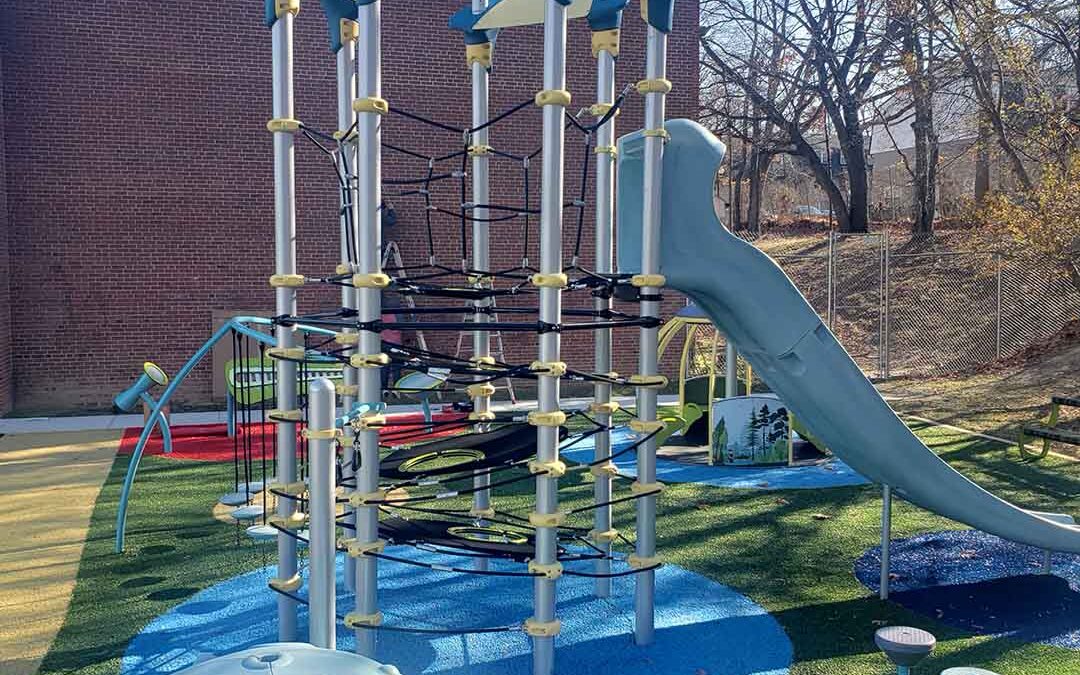
by gelld | Jan 17, 2024 | News
Voice of America reporter Dan Novak published this great article about the Orokawa Foundation Playground at Transformation Academy.
In less than six months since its completion, the state-of-the-art playground has drawn attention from around the country.
Learn more about how the playground serves our students beyond the traditional play setting. READ THE ARTICLE HERE:
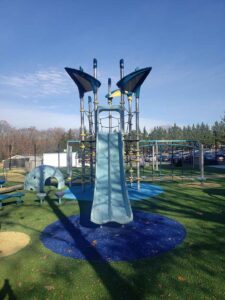
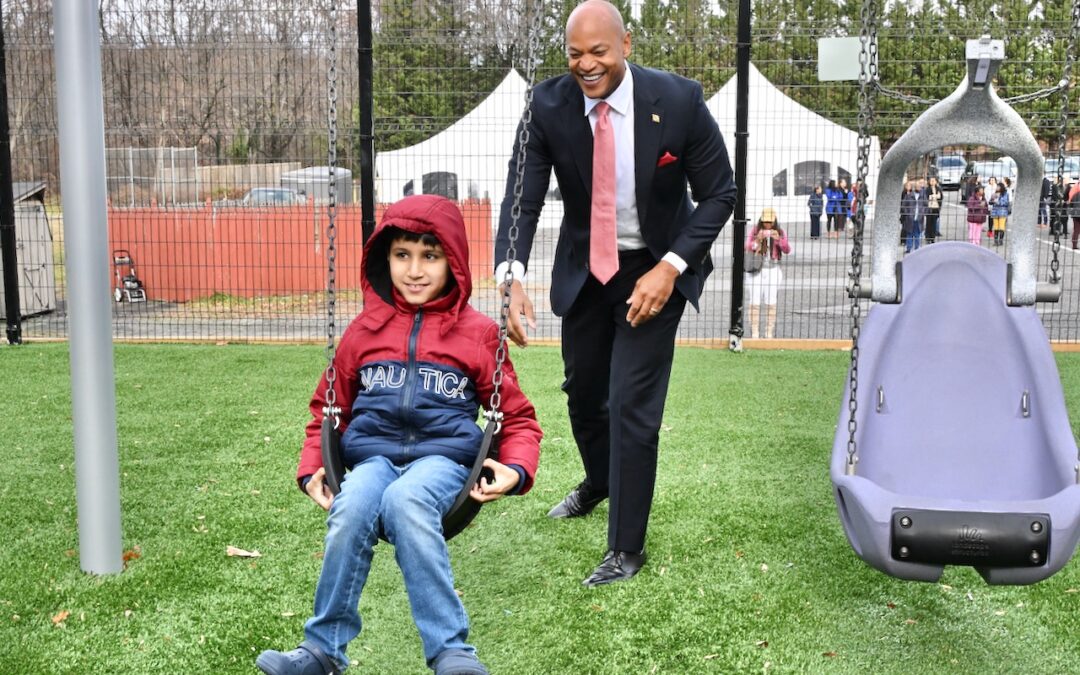
by gelld | Dec 5, 2023 | Events, News
BALTIMORE, MD, December 5, 2023 – The Children’s Guild – Transformation Academy, a 12-month, non-public separate day school based in Baltimore, MD, for students ages 5-21, whose primary diagnosis is autism, hosted Maryland Governor Wes Moore at a playground dedication ceremony. The Orokawa Foundation Playground, a brand-new outdoor sensory playground that features 25 inclusive elements that use both standard and customized components for students and caregivers to experience together, was built through a state grant and the support of the nonprofit foundation.
separate day school based in Baltimore, MD, for students ages 5-21, whose primary diagnosis is autism, hosted Maryland Governor Wes Moore at a playground dedication ceremony. The Orokawa Foundation Playground, a brand-new outdoor sensory playground that features 25 inclusive elements that use both standard and customized components for students and caregivers to experience together, was built through a state grant and the support of the nonprofit foundation.
The event featured remarks from the Governor, community leaders, and families whose lives will be positively impacted by this transformative space.
CLICK HERE TO WATCH OUR EVENT VIDEO

“Approximately 1 in 54 children in the United States have been diagnosed with autism spectrum disorder and we are pleased we are able to provide a grant to support The Children’s Guild – Transformation Academy,” said Gov. Moore. “Our goals are to enrich student experiences and accelerate student outcomes, as well as improve the quality of education for all children in Maryland, especially those who have been historically underserved. This new inclusive playground is a wonderful example of grant money hard at work.”
“We thank the Governor for recognizing the need at The Transformation Academy and providing the funding to build a beautiful play space for our students, many whom have the most severe form of autism and require substantial support,” said Jenny Livelli, President and CEO, The Children’s Guild. “We also thank The Orokawa Foundation for their generosity to support this wonderful new play space which means our students have access to equipment and an environment specially designed to meet their needs.”
“Every child should experience the joy of a playground. The Orokawa Foundation is thrilled to support this amazing project which promotes sensory exploration, sparks students’ creativity, and helps them develop a passion for learning beyond the classroom,” said Samantha Cleland Manekin, Executive Director. “We are also touched by the school’s gesture of honoring our father, Bruce Cleland, in such a meaningful way.”
The playground, designed by Sparks at Play, offers collaborative, imaginative, theatrical, structured, and non-structured play. The 25 inclusive elements use both standard and custom components for students who have sensory, autism, hearing, and learning disabilities. The play function links all the components – down to the surfaces which is made of artificial turf, so students have a completely sensory and accessible experience. The Orokawa Foundation Playground embodies a holistic approach, integrating a myriad of sensory experiences that encourage exploration, interaction, and imaginative play.
“The dedication of the Orokawa Foundation Playground marks a milestone in our school’s journey toward creating spaces that are truly inclusive. This playground is not just a recreational area; it’s a symbol of our dedication to ensuring that every child in our school feels welcomed and valued,” said Vesna Grujicic, Principal of Transformation Academy. “This new play space represents a significant milestone in our commitment to providing an inclusive educational environment. This space not only fosters play but also supports the social, emotional, and sensory needs of our students on the autism spectrum, empowering them to thrive.”
The Transformation Academy provides skills and support to students and their families across a variety of settings including home, workplace, and community. The teachers and administrators provide programming to foster growth and independence for each student utilizing a collaborative team approach of highly trained professionals, including special education teachers, speech-language pathologists, occupational therapists, behavior specialists, transition coordinators, and therapeutic behavior aides.
The Transformation Academy is part of The Children’s Guild (TCG), founded in 1953 and celebrating its 70th anniversary. TCG is a leading MidAtlantic nonprofit organization focused on helping students and families find success socially, emotionally, educationally, and developmentally through special education and charter schools, school-based mental health services, treatment foster care, autism services, family mental and behavioral health services, and workforce development programs. Affiliates of The Children’s Guild include The Children’s Guild School of Baltimore, The Children’s Guild DC Public Charter School, The Children’s Guild School of Prince George County, Monarch Academy Glen Burnie, Monarch Global Academy Global Laurel, Monarch Academy Annapolis, Monarch Preschool College Park, The Children’s Guild- Transformation Academy, The Outpatient Mental Health Clinic (OMHC), Treatment Foster Care, TranZed Academy for Working Students (TAWS), and TranZed Apprenticeships. For more information, visit https://childrensguild.org/.
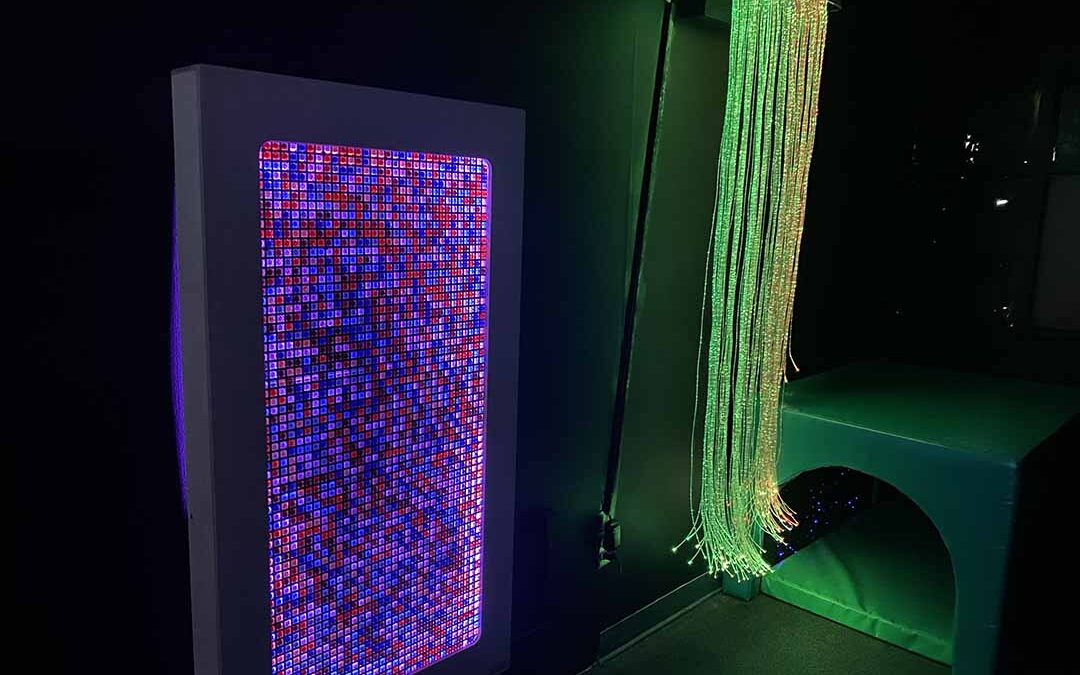
by Sundaram | Apr 24, 2023 | News
Does your child’s school have a sensory room set up? Would your young scholar benefit from time spent in this room? Let’s examine what makes a good sensory room for an elementary school.
- Safe and secure. The room should be safe and secure, with no hazardous objects or potential dangers for children. The room should be equipped with child-proof locks to prevent children from leaving the room without adult supervision.
- Sensory equipment. A variety of sensory equipment should be available, such as weighted blankets,
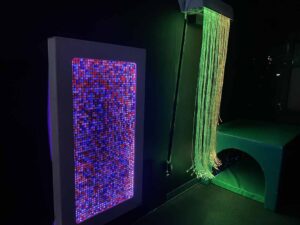 sensory swings, trampolines, therapy balls, sensory tables, bubble tubes, tactile surfaces, and sound and light systems. This equipment should be age-appropriate and provide a range of sensory experiences.
sensory swings, trampolines, therapy balls, sensory tables, bubble tubes, tactile surfaces, and sound and light systems. This equipment should be age-appropriate and provide a range of sensory experiences.
- Calming colors. The color scheme of the sensory room should be calming and soothing, with soft and neutral colors such as blue, green and beige. Bright and contrasting colors can be overstimulating and may cause sensory overload.
- Noise reduction. The room should be designed to reduce noise levels, with sound-absorbing materials such as carpets, curtains, and acoustic panels. White noise machines or calming music can also help to create a peaceful environment.
- Visual stimulation. The room should have visual stimulation, such as calming images, pictures or videos that can be projected on the wall. This can help students to focus and reduce stress.
- Clear rules. Clear rules and guidelines should be established for the use of the sensory room. These should include expectations for behavior, length of stay, and adult supervision.
- Regular maintenance. Regular maintenance of the sensory room is essential to ensure that all equipment is functioning correctly, and the room is clean, safe, and comfortable for students.
- Training for staff. Staff members should be trained in the use of the sensory room and how to support students with sensory processing difficulties. This can include strategies for managing challenging behaviors and identifying triggers for sensory overload.
By providing a well-designed sensory room, elementary schools can create a safe and calming environment that helps students with sensory processing difficulties to regulate their emotions and improve their academic performance.
Ask your school counselor if this is available for your child!
The Children’s Guild’s schools all offer sensory support for their students. The Children’s Guild maintains a staff of educators as well as physical and mental health providers committed to SEED-ing growth in every child. Administration of Social, Emotional, Educational, and Developmental learning is how we demonstrate The Guild’s core values of respect, promise, and hope.
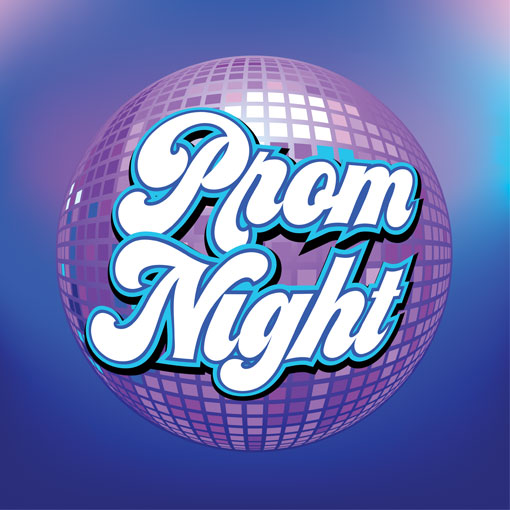
by thechildrensguild | Aug 11, 2022 | Events, News
On Friday, August 12th, 36 students from The Children’s Guild Transformation Academy in Baltimore will get dressed up and go to the prom to celebrate the start of their new year in this special education school that has become a thriving environment for dozens of students ages 5-21 whose primary diagnosis is autism. Many of the students also have co-existing diagnoses of sensory processing disorder, a specific learning disability, health impairment or multiple disabilities.
According to Ariel Long, One-to-One Administrator and Teacher Katie Boyle, “All students should have the opportunity to go to the prom, and we are so looking forward to giving our students the chance to Be A Star at Prom 2022. Instead of crowning a prom king and queen, we will be recognizing each student with for their individual accomplishments and what makes them so special.”
- What: Be A Star Prom 2022, featuring red carpet student introductions, a corsage building station, photo booth, and informal fun awards
- Date: Friday, August 12, 2022
- Time: 12:00 – 2:30 pm
- Location: 6802 McClean Blvd., Baltimore, MD 21234 (Gymnasium)
The Transformation Academy provides skills and support to students and their families across a variety of settings including home, workplace, and community. The teachers and administrators provide programming to foster growth and independence for each student utilizing a collaborative team approach of highly trained professionals, including special education teachers, speech-language pathologists, occupational therapists, behavior specialists, transition coordinators, and therapeutic behavior aides.
The Transformation Academy is part of The Children’s Guild schools and programs which respond to the unique needs of every child, family, and community it serves. The organization is one of the largest providers of charter schools, special education, autism services, treatment foster care, and family mental and behavioral health services in the region.
Affiliates of The Children’s Guild include The Children’s Guild, Inc., Baltimore Campus, The Children’s Guild DC Public Charter School, The Children’s Guild – Prince George Campus, Monarch Academy Glen Burnie, Monarch Academy Global – Laurel, Monarch Academy Annapolis, The Outpatient Mental Health Clinic, Treatment Foster Care, The Children’s Guild- Transformation Academy, Monarch Preschool College Park, TranZed Academy for Working Students (TAWS), and TranZed Apprenticeships. For more information, visit https://childrensguild.org/.
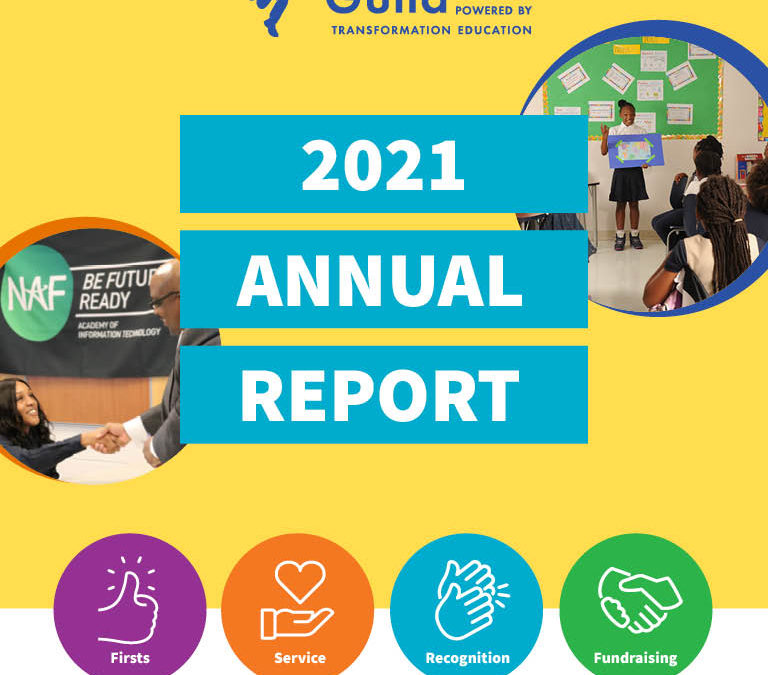
by thechildrensguild | May 18, 2022 | News
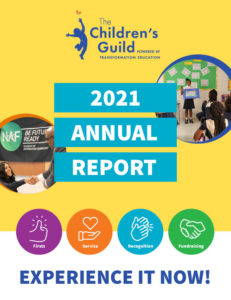 The firsts we achieved, the service we undertook, the recognition we earned, and the funds we raised to better serve communities made 2021 a year to remember for The Children’s Guild. Join us to reflect on an inspiring year by checking out our 2021 Annual Report.
The firsts we achieved, the service we undertook, the recognition we earned, and the funds we raised to better serve communities made 2021 a year to remember for The Children’s Guild. Join us to reflect on an inspiring year by checking out our 2021 Annual Report.
The new look and feel of the Annual Report helps to better demonstrate the exciting things happening in The Children’s Guild. The successes we experienced in 2021 are celebrated by our participating families and communities, and our talented and highly trained staff across all our schools and programs. And they’re made possible by the generous support from our donors and board of directors.
This presentation shares some of the amazing stories from 2021, including the opening of Transformation Academy, the expanded services offered by many of our schools and programs, The Children’s Guild, Inc., Baltimore Campus’ success in statewide competition, and many other stories. Also included in this report is an overview of our 2021 financials.
During this past year, we have grown and expanded our influence and impact. The Children’s Guild will continue to provide individualized transformational experiences that help ensure children, families, and their communities thrive. 2021 put us a step closer to achieving our vision: generations of curious and courageous children, healthy families, and thriving communities. The impact that The Children’s Guild made in 2021 will continue to move us to do big things for those we serve in 2022.
Experience the 2021 Annual Report presentation today!





 separate day school based in Baltimore, MD, for students ages 5-21, whose primary diagnosis is autism, hosted Maryland Governor Wes Moore at a playground dedication ceremony. The Orokawa Foundation Playground, a brand-new outdoor sensory playground that features 25 inclusive elements that use both standard and customized components for students and caregivers to experience together, was built through a state grant and the support of the nonprofit foundation.
separate day school based in Baltimore, MD, for students ages 5-21, whose primary diagnosis is autism, hosted Maryland Governor Wes Moore at a playground dedication ceremony. The Orokawa Foundation Playground, a brand-new outdoor sensory playground that features 25 inclusive elements that use both standard and customized components for students and caregivers to experience together, was built through a state grant and the support of the nonprofit foundation.

 sensory swings, trampolines, therapy balls, sensory tables, bubble tubes, tactile surfaces, and sound and light systems. This equipment should be age-appropriate and provide a range of sensory experiences.
sensory swings, trampolines, therapy balls, sensory tables, bubble tubes, tactile surfaces, and sound and light systems. This equipment should be age-appropriate and provide a range of sensory experiences.


 The firsts we achieved, the service we undertook, the recognition we earned, and the funds we raised to better serve communities made 2021 a year to remember for The Children’s Guild. Join us to reflect on an inspiring year by checking out our 2021 Annual Report.
The firsts we achieved, the service we undertook, the recognition we earned, and the funds we raised to better serve communities made 2021 a year to remember for The Children’s Guild. Join us to reflect on an inspiring year by checking out our 2021 Annual Report.
